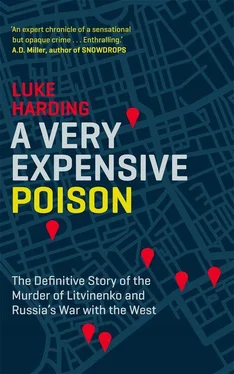With time running out, Litvinenko is working furiously to solve the conundrum. The transcript reads:
CARTER [LITVINENKO]: Only these three people can poison me.
DI HYATT: These three.
CARTER: Mario, Vadim [Kovtun] and Andrei.
After four or five hours of interviews, the case begins to cohere. There are moments when it appears that there are three officers hard at work: Hyatt, Hoar and Litvinenko, the punctilious ex-cop. By this point Litvinenko is speaking Russian. The investigation gains new momentum. Information is passed back to SO15, the counter-terrorist command at Scotland Yard, headed by Detective Superintendent Clive Timmons.
Litvinenko explains that his most important papers are kept at home, in the lower shelf of a large cupboard. The papers include critical information on Putin, and the people around him, from newspapers and other sources, as well as background on Russian criminal gangs. He gives the police his email password and bank account. He tells them where they can find receipts for two Orange SIM cards, bought for £20 from a store in Bond Street – in a black leather wallet on his bedside table. Litvinenko explains that he gave one of the SIMs to Lugovoi; they used these secret numbers to communicate. He hands over his diary.
It was, Litvinenko says, Lugovoi who insisted the pair of them meet at the Millennium Hotel on 1 November. They were originally scheduled to meet the following day, at the offices of security company Global Risk. Litvinenko shows Hyatt his note of the appointment. He uses a code for ‘Lugovoi’ – tragic in hindsight – calling him ‘Friend 2’.
‘We were to meet on the second. But he called me in the morning and said he had already arrived and he would like to meet me for a short time on the first,’ Litvinenko says.
DI Hyatt produces a map of central London. With a little difficulty, Litvinenko retraces his probable route to Grosvenor Square – north along Old Bond Street, along Grafton Street, and then Berkeley Square.
He describes meeting Lugovoi in the Millennium lobby and going with him to the Pine Bar. Lugovoi was dressed, Litvinenko says, in clothes he had bought three months earlier on a shopping trip to Harrods, London’s most famous department store – ‘a kind of cardigan’, dark blue and orange. Litvinenko said he didn’t think much of Lugovoi’s expensive, flashy style. ‘We were in Harrods … I said to him then, “Why do you need this Harrods?”’ There were further details – Lugovoi was wearing greyish jeans, ‘fashionable’ shoes, ‘but not English make’, and a big gold watch with a black face. ‘It was very visible. Before he [Lugovoi] had told me that this watch cost $50,000.’
Ever helpful, Litvinenko phones his wife and asks her to locate a photo of Lugovoi at their home. Hyatt suspends the interview to secure the photograph. Lugovoi is now a prime suspect. Litvinenko describes him like this: ‘Andrei is a pure European, and even he looks a little bit like me, sort of. The same type as like me … I am 1 m 77 cm, 1 m 78 cm, so he is probably 1 m 76 cm. He is two years younger than me, light hair.’ He has a small, ‘almost invisible’ bald patch.
The transcript says:
DI HYATT: Edwin, do you consider Andrei to be a friend of yours, or a business associate? What, how do you describe your relationship with Andrei?
CARTER: He is not a friend. He is a business partner.
At the end of his second day of interviews, on 19 November, Litvinenko describes getting a lift back home with his Chechen friend Zakayev: ‘Now the paradoxical thing is that I was still feeling very well but then somehow I had some kind of feeling that something might happen to me in the nearest future. Maybe subconsciously.’ The detectives turn off the tape.
It’s a full and frank account of events leading up to his poisoning – with one exception. During these two days Litvinenko doesn’t mention his secret life and his job working for British intelligence. It’s only the next day that he speaks of his meeting on 31 October with his MI6 handler ‘Martin’, in the basement café of the Waterstone’s bookshop on Piccadilly. Litvinenko is chary, evidently reluctant to discuss his undercover MI6 role.
The conversation runs:
CARTER: On 31 October at about 4 p.m. I had a meeting arranged with a person about whom I wouldn’t really like to talk here because I have some commitments. You can contact that person on that long telephone number which I gave you.
DI HYATT: Did you meet with that person, Edwin?
CARTER: Yes.
DI HYATT: Edwin, it could be absolutely vital that you tell us who that person is.
CARTER: You can call him and he will tell you.
The interview abruptly stops. It’s 5.16 p.m. Hyatt dials the long telephone number, reaches ‘Martin’, and tells him that Litvinenko is gravely ill in hospital, the victim of an apparent poisoning by two mysterious Russians.
It appears to be the first time that MI6 – an organisation famed for its professionalism – learns of Litvinenko’s plight. Litvinenko, of course, wasn’t a full-time employee. But he was a salaried informant, with his own encrypted cell phone, and MI6-provided passport. The agency appears not to have classified Litvinenko as being at risk, despite numerous threatening phone calls from Moscow and the firebomb attack on his north London home.
MI6’s reaction is unclear. The British government has still refused to release the relevant files. One can imagine panic and embarrassment. And the agency shifting into full-blown crisis mode. The transcripts show that after speaking to DI Hyatt, ‘Martin’ scrambled to Litvinenko’s hospital bedside. He talked to his poisoned agent, and left around 7.15 p.m. The police interview then resumes; Litvinenko continues his account of his Waterstone’s meeting with ‘Martin’ in coy terms:
DI HYATT: Was that a meeting that was pre-arranged or was it a meeting that happened by chance?
CARTER: No, we called each other in advance and met up.
DI HYATT: OK. I don’t want you to tell me the name of that person, Edwin, but can you tell me if that person is the person that I’ve been speaking to in your presence in this hospital around about fifteen minutes ago?
CARTER: Yes, that is absolutely correct.
The final exchanges deal with earlier threats against Litvinenko from the Kremlin and its emissaries. The detectives ask if there is anything Litvinenko would like to add.
DS HOAR: Can you think of anybody else who may wish to do this sort of harm to you?
CARTER: I have no doubt who wanted it, and I often receive threats from these people. This was done … I have no doubt whatsoever that this was done by the Russian Secret Services. Having knowledge of the system I know that the order about such a killing of a citizen of another country on its territory, especially if it is something to do with Great Britain, could have been given by only one person.
DI HYATT: Would you like to tell us who that person is, sir? Edwin?
CARTER: That person is the president of the Russian Federation, Vladimir PUTIN. And if … you of course know, whilst he’s still President, you won’t be able to prosecute him as the main person who gave that order, because he is the president of a huge country crammed with nuclear, chemical and bacteriological weapons. But I have no doubt whatsoever that as soon as the power changes in Russia or when the first officer of Russian Special Services defects to the west he will say the same. He will say that I have been poisoned by the Russian Special Services on Putin’s order.
Litvinenko returns to the theme of Putin’s culpability in his last two interviews, at 8.06 p.m. and 8.39 p.m. respectively. He is moving and lucid. And perceptive: Litvinenko is aware that his case raises a major dilemma for western governments. How should they deal with the head of a powerful, energy-rich state who, apparently, has his enemies murdered?
Читать дальше












